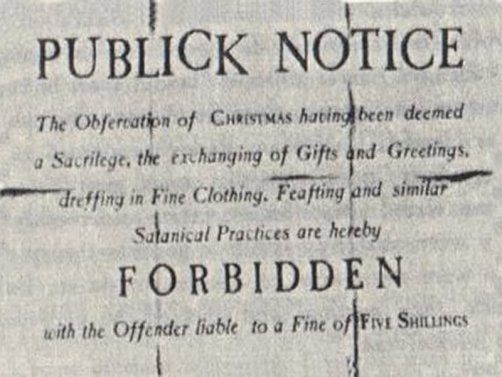In 1647, the Puritans’ attempts to ban Christmas and force shops to open on Christmas day lead to rioting in Ipswich, Oxford, Ealing and Canterbury where a wild game of street football prevented the Mayor from opening the market.
By a decision of parliament, the traditional 12-day Christmas celebrations were declared completely banned. All stores were to remain open, including on December 25. Christmas decorations were banned, as was the consumption of large quantities of alcohol. According to modern historians, this attack on Christmas has deep roots. Long before the outbreak of the English Revolution, a number of Puritans considered the festivities obscene and too tumultuous. There were also those who were dissatisfied with the connection of Christmas traditions with the old Catholic faith.
However, the ban caused great outrage and many people did not comply with it. In Norwich, for example, the mayor received a petition calling for the Christmas celebrations to take place. He could not support it publicly, but in no way prevented people from gathering to celebrate the holiday. A number of Kent residents also decided not to comply with the ban, indulging in merriment and decorating their homes. There were even festivities in the capital, London, and on the streets of some Suffolk towns, including Ipswich, young men armed with batons with nails driven into them “persuaded” shopkeepers to ignore the ban and not open at Christmas.
Historians today are unanimous that the restrictions imposed by parliament on the celebration of the great Christian holiday are just some of the reasons for people’s discontent. To a large extent, their revolt was a political act. It was directed against the “new normal” and the very idea that merriment could be harmful to society. People were simply tired of the restrictions and financial difficulties they faced as a result of the revolution and the Presbyterian system imposed on them.
Mass riots
The days after Christmas turned out to be especially dramatic. The mayor of Norwich was summoned to London to explain why he had failed to comply with the ban on celebrations. However, many locals gathered and barricaded the city gates to prevent authorities from taking him to the capital. Military troops were sent to Norwich to quell the riots. An ammunition depot exploded in the ensuing clashes. The blast killed at least 40 people.
Similar events took place elsewhere. In Kent, for example, the authorities have decided that any violator of the ban must face the law and bear its consequences. This led to the outbreak of mass riots. Supporters of Charles I tried to take advantage of the discontent of the people, including riots against parliament. The riots engulfed a number of settlements and lasted for more than a year, which later became one of the reasons for the lifting of the ban on the celebration of Christmas.
The civil war ended successfully for the parliamentarians, who finally lifted the Christmas ban a few years after it was imposed. In the course of the conflict, King Charles I was executed and his son Charles II was sent into exile. The events of the revolution proved to be a turning point in English history. They led to the transformation of the country from an absolute to a constitutional monarchy. The king’s power was already limited and civil liberties guaranteed.









